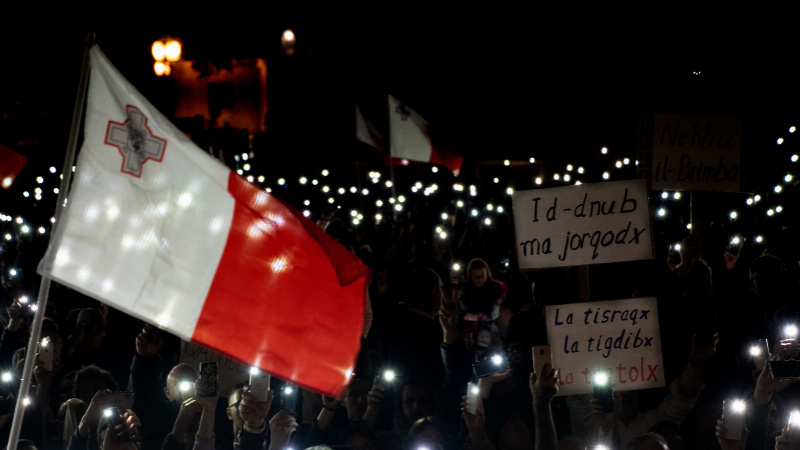We’ve put an ignominious Republic Day commemoration behind us, and we are fast approaching the groggy Yuletide period that is known to soften even the toughest of hearts.
We might not be about to witness a Christmas Truce from across the trenches but there is a perceivable effort to ride on the goodwill feelings of the season. The idea would be to blend them into the “business as usual” propagandistic effort that drums the idea that “the worst is over” into our heads with a repetitiveness that would bring The Little Drummer boy to shame.
It was not just the Maltese in Brussels calling for Muscat’s resignation on his trip there. His newfound status as Europe’s Latest Pariah was made patently obvious as the Heads of State of the EU gathered for their photo doing their damned best to ignore his presence.
Muscat’s propaganda machine tried to hide this uncomfortable truth by posting photos of last year’s meeting – a clear sign of the discomfort being felt in some quarters. It would be normal if this were North Korea not It-Torċa, but the blurring of lines of normality has been accepted particularly by the cognitively dissonant crowds of adulators.
It is hard to keep up with the spin – particularly when there is more than one narrative being spun. Clearly the incumbent power is having nothing of the ‘gang of shame’ spiel uttered by the President of the Republic. Those words came along with the usual mantra straight from the partisan handbook; ‘saddened, shocked and hurt’. It borrows from the Catholic convenience of penitence followed by absolution, yet without going through the telling stage of contrition.
The outgoing (slowly) Prime Minister gives no sign of contrition whenever he dares speak to the public (notably only to an exclusively friendly audience).
During one of the nauseating fundraising marathons on home territory, Muscat and the self-anointed First Lady gave a terrifying rendition of hypocritical propagandistic theatre. They combined insipid viciousness with revolting faux humility – not once was there any sign of contrition, an admission of having been wrong, an apology for having (in the least) allowed for such criminal impunity to exist in the nation’s highest office.
Had Nicolae and Elena Ceausescu been afforded a TV interview instead of being dragged into shame by the rebellious crowds, this would have been it.
Speaking of the Romanian dictator, his successor (Iliescu) would later be indicted in Romania for (among other charges) “directly spreading misinformation through televised appearances and press releases, contributing to the institution of a generalised psychosis”.
Those aspiring to replace Muscat have already signed up to his narrative. Their pitch is on the lines of a sense of continuity minus what they strongly believe to be an alien infiltration that has ruined (wait for the mantra) “all the good work that this Labour government (with a newly rediscovered social-democrat aspiration) has done”.
While the story might stick for the adulating crowds of Party diehards, it is not easy to believe any promises of reform coming from within the comfort of partisan majorities.
Take Fearne’s 100-day plan that supposedly gives “rule of law” a priority. The remit of his conference (a commendable idea insofar as the formation is concerned) is limited to the appointment of police commissioner, attorney general and members of the judiciary. In other matters, Fearne still drums on with the idea of a successful government that has ‘meritocracy as a guiding light’.
Anybody with a modicum of sense can see that this cosmetic pitch towards the Rule of Law fails to consider the lack of accountability that this government has perpetrated in many aspects.
The remit of a real, impartial conference on reform beyond the partisan would reach much wider into such aspects as the formation of parliament, representation therein, the powers and roles of the executive, the appointment of authorities and bodies of government, and the role of political parties. That would just be a starter.
Nobody, from among Muscat’s MPs, has taken the real lead in cutting off completely from the workings of this government and promised a new beginning.
It would be a new beginning that is needed for both the Labour Party and for the country. It would require weaning the crowds off partisan-dependence. It is a tough ask to make of anyone within the strictures and structures of one of the PLPN Parties, especially when some are living in an obvious state of denial.
Just look at Malta’s own Jeremy Corbyn – the unelectable Adrian Delia. His pitch has shifted further into trying to be the common denominator for the new opposition that is the vociferous civil society. His 15 proposals are a commendable effort, but what Delia still cannot see is that the change the country needs requires a reformulating of the rules to such an extent that it could (and should) deliver a killer blow to the Parties as we know them.
All these efforts by the PLPN and their prophets at dumbing the electorate back into submission (and their idea of normality) can only be countered by a growing civil society movement.
This is the moment to seize. As we approach the period many celebrate as the arrival of the messiah, civil society would do well to up the ante and search within for a group of leaders – strengthened by the commonality of their aims that should be the birth of the New Republic.












